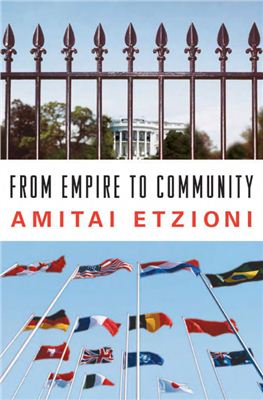Palgrave Macmillan, 2004. 259 p.
In this sweeping vision of an emerging world community, Etzioni, a distinguished sociologist and leading communitarian thinker, lays out a world order that charts a path between power-oriented realism and law-oriented liberalism. It is a vision in which U.S. power is closely tied to a wider global community infused with shared values and bolstered by legitimate institutions of goveance. Despite acrimony over the war in Iraq and U.S. unilateralism, this new era of global cooperation is already afoot, Etzioni claims. In fact, the leading edge of this emerging order is counterterrorism: govements share intelligence and jointly arrest suspects and track money, and the nascent "Global Safety Authority" even gained its own enforcement capability with recent agreements on search and seizure on the high seas. Transnational cooperation is also growing in other areas, such as commerce, banking, the Inteet, health, the environment, human rights, and crime prevention. Etzioni believes that effective global goveance requires normative and institutional innovations, and his most ambitious proposal is to unite the growing array of transnational authorities into a formal, United Nations-style global institution-a mode-day "world state. " This idea is worthy of debate. But today's informal and decentralized transnational networks may offer a more realistic formula for successful global goveance.
The Emerging Global Normative Synthesis
Basic Contours
Specific Elements of the Global Normative Synthesis
Containing Capitalism
Moral Dialogues
Implications for American (and Weste) Foreign Policy
A New Safety Architecture
The War against Terrorism and Saddam’s Iraq: Contrasting Designs
Hobbesian versus Lockean Global Agendas
Curtailing National Sovereignty: For What?
Beyond Global Safety
The Old System Is Overloaded
Global Civil Society: Its Scope and Limits
New Global Authorities
Supranational Bodies
A Global Govement and Community?
In this sweeping vision of an emerging world community, Etzioni, a distinguished sociologist and leading communitarian thinker, lays out a world order that charts a path between power-oriented realism and law-oriented liberalism. It is a vision in which U.S. power is closely tied to a wider global community infused with shared values and bolstered by legitimate institutions of goveance. Despite acrimony over the war in Iraq and U.S. unilateralism, this new era of global cooperation is already afoot, Etzioni claims. In fact, the leading edge of this emerging order is counterterrorism: govements share intelligence and jointly arrest suspects and track money, and the nascent "Global Safety Authority" even gained its own enforcement capability with recent agreements on search and seizure on the high seas. Transnational cooperation is also growing in other areas, such as commerce, banking, the Inteet, health, the environment, human rights, and crime prevention. Etzioni believes that effective global goveance requires normative and institutional innovations, and his most ambitious proposal is to unite the growing array of transnational authorities into a formal, United Nations-style global institution-a mode-day "world state. " This idea is worthy of debate. But today's informal and decentralized transnational networks may offer a more realistic formula for successful global goveance.
The Emerging Global Normative Synthesis
Basic Contours
Specific Elements of the Global Normative Synthesis
Containing Capitalism
Moral Dialogues
Implications for American (and Weste) Foreign Policy
A New Safety Architecture
The War against Terrorism and Saddam’s Iraq: Contrasting Designs
Hobbesian versus Lockean Global Agendas
Curtailing National Sovereignty: For What?
Beyond Global Safety
The Old System Is Overloaded
Global Civil Society: Its Scope and Limits
New Global Authorities
Supranational Bodies
A Global Govement and Community?

